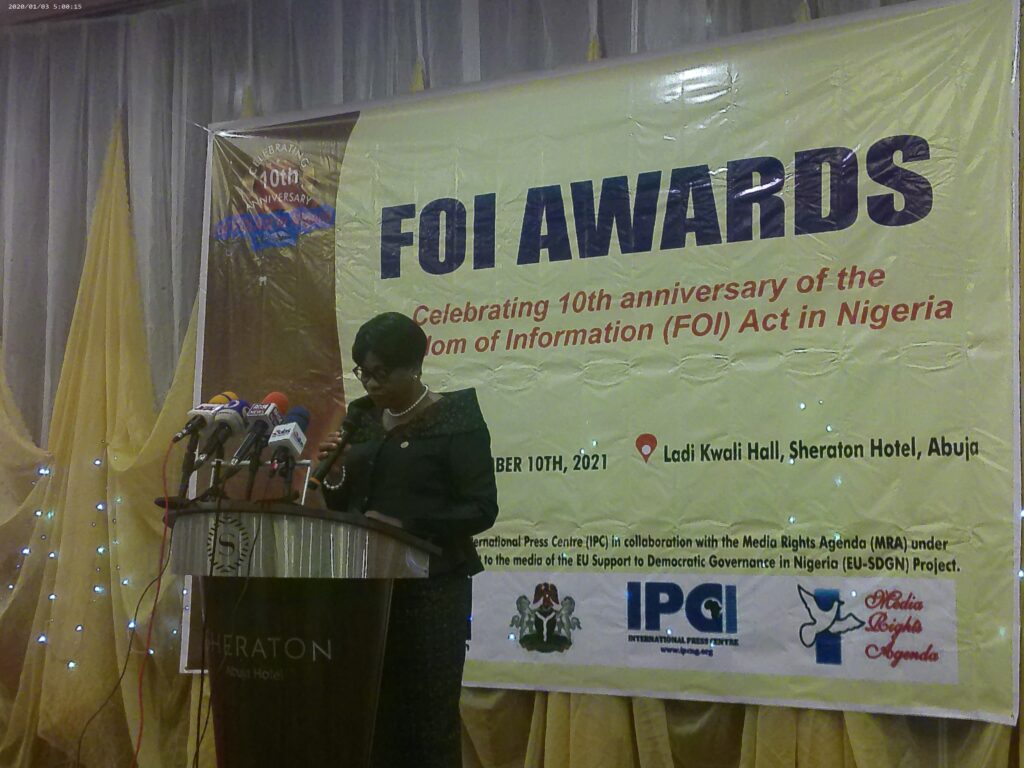A judge of the African Court on Human and Peoples’ Rights in Arusha, Tanzania, Justice Stella Anukam, has called on the Nigerian Government to enable direct access to the court for Nigerian citizens and non-governmental organizations (NGOs). Under an amendment of Article 34(6) of the Protocol of the Court by a decision of the Assembly of Heads of State and Government of the African Union (AU), a member state may make a Declaration to allow individuals and NGOs in the country direct access to the Court to litigate cases of human rights violations.
In her opening remarks as Chair of the National Freedom of Information Awards ceremony organized by the International Press Centre (IPC) and Media Rights Agenda (MRA) in Abuja on December 10, 2021, Justice Anukam stressed the need for Nigeria to make the required declaration under Article 34(6) of the court’s protocols, allowing its citizens and NGOs direct access to the African Court.
She noted that the mandate of the African Court, where she currently serve as a judge, is to strengthen the human rights protection system in Africa and ensure respect for and compliance with the African Charter on Human and Peoples’ Rights as well as other international human rights instruments.
According to her, although the court performs its functions principally through the adjudication of human rights cases and rendering of judicial decisions, there is no doubt that the enjoyment of human rights, including the right to information, will be better enhanced when people are aware of their rights and can exercise them.
Justice Anukam remarked that it was appropriate to use the occasion of the global celebration of the 2021 International Human Rights Day to commemorate the 10th year anniversary of the existence of the Freedom of Information Act in Nigeria, saying it was equally notable that the occasion was also being used to honour some of those who made various contributions to the emergence of the Act or are playing significant roles in making the exercise and enjoyment of the right to information meaningful for Nigerians, through the different roles they are playing in applying the Law and ensuring its implementation.
She said: “Events such as this are therefore doubly important for me because they serve to acknowledge and honour the efforts of those who are making or have contributed to making the right to information meaningful. As I understand it, some of those being honoured have earned recognition because of different roles that they played to ensure the codification of the right of access to information in the form of the FOI Act or by their efforts in ensuring the effective implementation of this instrument that guarantees the right to information.”
Justice Anukam explained that the event was consistent with her engagement and interest in ensuring that people are able to exercise and enjoy the rights that are guaranteed in key human rights instruments applicable on the African continent, including the right of access to information for which the African Court has established a robust jurisprudence.
She said the FOI Act was particularly close to her heart, firstly because of her personal interest and belief in the right of people to access information which enables them to make informed decisions on various issues affecting their lives but also because of her former role as Head of the FOI Unit at the Federal Ministry of Justice, describing it as the “engine room for the implementation of the Act in Nigeria.”
The judge recalled that in that role, she was privileged to see the implementation challenges confronting the FOI Act as well as to see its many benefits to the society and the country as a whole, both for the government, its officials and institutions, as duty bearers as well as for the citizens as the rights holders.
Commending the theme of the essay competition organized for mass communication and journalism undergraduates on “Deepening Democracy, the Impact of FOI Act 10 Years After” as part of the 10th year anniversary commemoration to be very appropriate, she said: “I strongly believe that this is a good time, after 10 years of implementation, to take stock and examine the impact that the FOI Act has had in bringing about transparent and accountable governance as well as in enhancing participatory democracy in Nigeria.”
Justice Anukam called on stakeholders to take the opportunity of the celebration to reflect on the journey that resulted in the passage of the FOI Act in 2011 and the 10 years of its implementation and examine some of the implementation challenges that have continued to impede the effectiveness of the Law and the full enjoyment of the right to information by Nigerians.
She urged them to see the day as a milestone in the journey to create an enlightened and informed society and think of the steps that are still required to reach the desired destination.







